
Stephen Ray Vaughan was an American musician, best known as the guitarist and frontman of the blues rock trio Stevie Ray Vaughan and Double Trouble. Although his mainstream career spanned only seven years, he is regarded as one of the most influential musicians in the history of blues music, and one of the greatest guitarists of all time. He was the younger brother of guitarist Jimmie Vaughan.

Texas Flood is the debut studio album by the American blues rock band Stevie Ray Vaughan and Double Trouble, released on June 13, 1983, by Epic Records. The album was named after a cover song featured on the album, "Texas Flood", which was first recorded by blues singer Larry Davis in 1958. Produced by the band and recording engineer Richard Mullen, Texas Flood was recorded in the space of three days at Jackson Browne's personal recording studio in Los Angeles. Vaughan wrote six of the album's ten tracks.

In Step is the fourth studio album by Stevie Ray Vaughan and Double Trouble, released in 1989. The title In Step can be seen as referring to Vaughan's new-found sobriety, following the years of drug and alcohol use that eventually led Vaughan into rehabilitation. It was also Vaughan's final album with Double Trouble and the last album to be released during his lifetime. In 1990, he recorded an album with his brother, Jimmie Vaughan, called Family Style; later that same year, Stevie Ray Vaughan died in a helicopter crash.
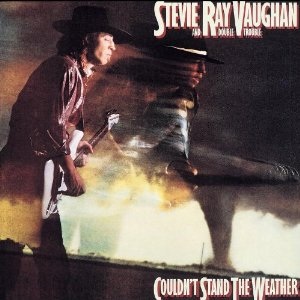
Couldn't Stand the Weather is the second studio album by American blues rock band Stevie Ray Vaughan and Double Trouble. It was released on May 15, 1984, by Epic Records as the follow-up to the band's critically and commercially successful 1983 album, Texas Flood. Recording sessions took place in January 1984 at the Power Station in New York City.

Soul to Soul is the third studio album by American blues rock band Stevie Ray Vaughan and Double Trouble released on September 30, 1985, by Epic Records. Recording sessions took place between March and May 1985 at the Dallas Sound Lab in Dallas, Texas. Vaughan wrote four of Soul to Soul's ten tracks; two songs were released as singles. The album went to #34 on the Billboard 200 chart and the music video for "Change It" received regular rotation on MTV. In 1999, a reissue of the album was released, which includes an audio interview segment and two studio outtakes.
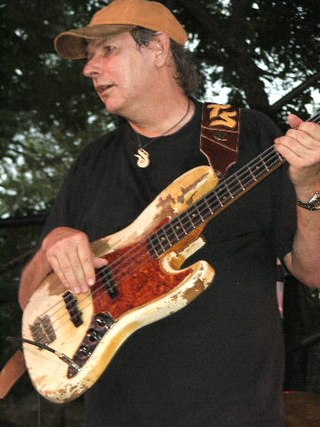
Tommy Shannon is an American bass guitarist, who is best known as a member of Double Trouble, a blues rock band led by Stevie Ray Vaughan. Born in Tucson, Arizona, Shannon moved to Dumas, Texas when he was nine, where he originally started as a guitarist, though he started playing bass at the age of 21. He appeared with Johnny Winter at Woodstock in 1969. He later joined Double Trouble in 1981 and became a permanent member of Double Trouble until Vaughan's death in 1990. Shannon and bandmate Chris Layton later formed supergroups such as the Arc Angels.

"Voodoo Child (Slight Return)" is a song written by Jimi Hendrix and recorded by the Jimi Hendrix Experience in 1968 that appears as the final track on the groups's third studio album, Electric Ladyland, released that year. It contains improvised guitar and a vocal from Hendrix, backed by Noel Redding on bass and Mitch Mitchell on drums. The song is one of Hendrix's best known; it was a feature of his concert performances throughout his career, and several live renditions were recorded and released on later albums.

Double Trouble is an American blues rock band from Austin, Texas, which served as the backing band for singer-guitarist Stevie Ray Vaughan. The group was active throughout the 1980s and contributed to reviving blues music, inspiring many later blues and rock acts. Formed in Austin, Texas in 1978, the group went through several early line-up changes before settling on a power trio consisting of Vaughan, Chris Layton (drums), Tommy Shannon (bass). They became a four-piece by 1985 after adding Reese Wynans (keyboards). Whilst with Vaughan they were billed Stevie Ray Vaughan and Double Trouble. Rooted in blues and rock music, the group worked in various genres ranging from ballads to soul, often incorporating jazz and other musical elements.

Live at Carnegie Hall is the third live album by American blues rock band Stevie Ray Vaughan and Double Trouble, released by Epic Records in July 1997. The album consists of live selections from their sold-out October 4, 1984, benefit concert at Carnegie Hall for the T.J. Martell Foundation. Backed by a ten-piece big band for the second half of the event, Vaughan had celebrated his thirtieth birthday the night before, and called the concert his "best birthday ever, forever". The band's double-set performance, which included several blues and R&B standards, was highly successful, receiving mostly positive reviews from music critics.

Live Alive is the first live album compiled from four live performances by Stevie Ray Vaughan and Double Trouble. The performances were recorded on July 15, 1985 at the Montreux Jazz Festival; July 17–18, 1986 at the Austin Opera House; and July 19, 1986 at Dallas Starfest. Much of the album was overdubbed in the studio.
"Lenny" is the tenth and final track on the first Stevie Ray Vaughan and Double Trouble album Texas Flood. The song is in 4/4 time and notated in the key of E flat major. It is played very slowly and freely, with Vaughan alternating between jazz-inflected chords and solo runs. The main chord featured in the song is a movable major 6th chord to which Vaughan applies moderate vibrato with the tremolo bar. The solos incorporate the E major scale, the E minor pentatonic scale, and the E Minor blues scale. Its style is influenced by Jimi Hendrix ballads like "The Wind Cries Mary". The song was written and named for Vaughan's wife at the time, Lenora. Vaughan also named one of his guitars "Lenny", which he used on "Lenny" and on his later instrumental ballad, "Riviera Paradise". The track was often played at live shows.
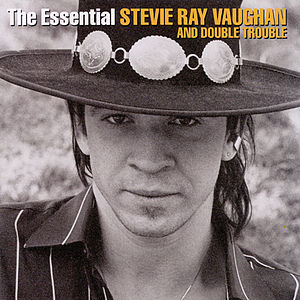
The Essential Stevie Ray Vaughan and Double Trouble is a compilation album of recorded material by American singer, songwriter and guitarist Stevie Ray Vaughan and his backing band Double Trouble, released in 2002. The album was released by Epic Records and includes songs from 1980 to 1990 including several live tracks on two discs. In 2008, the album was re-released as part of the Limited Edition 3.0 series, with a third bonus disc containing six additional songs culled from studio albums.
"Third Stone from the Sun" is a mostly instrumental composition by American musician Jimi Hendrix. It incorporates several musical approaches, including jazz and psychedelic rock, with brief spoken passages. The title reflects Hendrix's interest in science fiction and is a reference to Earth in its position as the third planet away from the sun in the solar system.
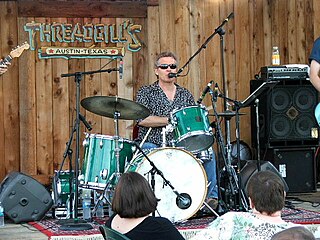
Doyle Bramhall Sr. was an American blues singer, guitarist and drummer with deep roots in the Austin, Texas music scene.
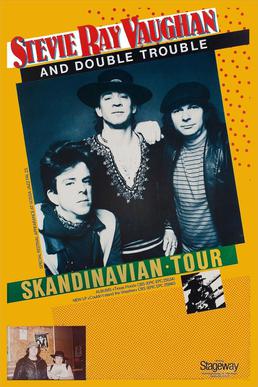
The Couldn't Stand the Weather Tour was a worldwide concert tour by blues rock band Stevie Ray Vaughan and Double Trouble. Produced in support of their 1984 album Couldn't Stand the Weather, the tour visited North America, Europe, Australasia and Japan from 1984 to 1985. To reflect the new musical direction that the group took with Couldn't Stand the Weather, the tour was aimed to differ from their past and surpass expectations of the band. In comparison to Vaughan and Double Trouble's modest stage setup from the previous Texas Flood Tour, the Couldn't Stand the Weather Tour involved a slightly more elaborate production. It utilized grander amplifier setups and sound systems to take advantage of the larger venues in which they performed. To avoid their renowned strictly blues material, Vaughan and Double Trouble embodied a more expanded and varied repertoire during performances. In disparity to the previous tour, each of the Couldn't Stand the Weather shows opened with mostly the same three songs before other material was played. The album and the tour were the beginnings of the group's mid-eighties musical development.
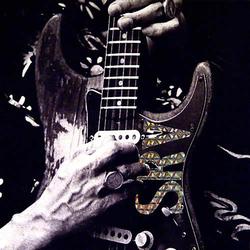
The Real Deal: Greatest Hits, Volume 2 is a compilation album of material by Stevie Ray Vaughan in 1999. The album was released by Epic Records and includes material from the five studio albums he released with Double Trouble as well as live material and collaborations with brother Jimmie and surf guitarist Dick Dale.

Stevie Ray Vaughan was an American blues rock guitarist, singer, and songwriter, and the frontman for the band Double Trouble. He is often regarded as one of the greatest guitarists and blues musicians of all time. During his career, he released four studio albums, one live album, and several singles.

Live from Austin, Texas is a live video by Stevie Ray Vaughan and Double Trouble. It is a retrospective of the band's two performances on Austin City Limits in 1983 and 1989. The film was released as a DVD on September 3, 1997.

Greatest Hits is a compilation album by Stevie Ray Vaughan and Double Trouble released in 1995. It was also released on vinyl in the U.S.

Live at Montreux 1982 & 1985 is the fourth live album of American blues musician Stevie Ray Vaughan and his band Double Trouble, recorded at the Montreux Jazz Festival on July 17, 1982 and July 15, 1985, and released November 20, 2001 on Epic Records. Neither are complete concerts.
















